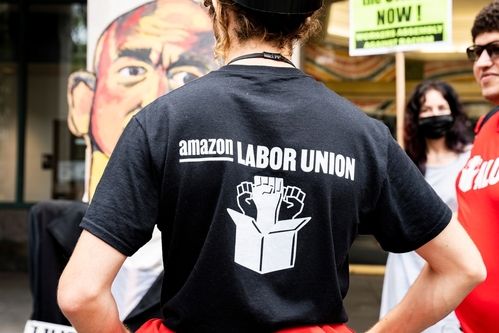Labor Union Shortage

By John Stossel
Monday is Labor Day. Will you celebrate unions?
The media does. "Unions are cool again," reports CBS News. They suggest unionization is booming.
"Reporters" practically cheered when a Starbucks in Buffalo, New York, became the first Starbucks to unionize. "A big symbolic win for labor," The New York Times called it.
Since then, more than 180 Starbucks voted to unionize, and 300 filed for union elections.
Starbucks already offers better benefits than many companies: health benefits, even for part-time workers, free college tuition, maternity leave and more. Their minimum wage is $17/hour. But activists want more.
Apple Store employees and Google workers are also starting unionization efforts. In the first half of 2022, union election petitions increased by 57%.
They have political support. President Joe Biden promised he'd be "the most pro-union president you've ever seen," and he probably has been. He supports the PRO Act, which would override state right-to-work laws and fine employers that fire workers for trying to unionize.
The Washington Post claims there is a "wave of labor activism sweeping the country."
But despite all political support and media hype, unionization is down.
Unionization did increase during the pandemic but fell as the pandemic waned. In 2021, 15.8 million workers were represented by a union, a decline of half a million since 2019.
There are many reasons.
The Janus Supreme Court decision in 2018 declared it unconstitutional to force government workers to pay union dues. Now 28 states no longer force any workers to pay union dues. That's a good thing. No one should be forced to join groups they don't want to join.
In 1973, when I first went to work for CBS, I was forced to join AFTRA, the American Federation of Television and Radio Artists. I didn't want to. I didn't want to pay dues to a union that didn't appear to do much, but I had no choice.
At work, I saw how union rules routinely slowed work down -- sometimes in ridiculous ways. I couldn't just press a button and watch a video. I had to find a union editor and ask him to press the button.
One reason Fox News grew faster than CBS, NBC and ABC's news operations is that non-union Fox is more flexible. They are able to try new things. They didn't have to obey all the stupid rules.
This is another reason why the number of union workers has declined. Union rules limit their employers' ability to change, adapt and grow.
Non-union Toyota and Honda outgrew unionized companies like General Motors. They hired more people, created more jobs. That was good for labor, just not unionized labor.
Unionization helps some. But it hurts more.
Some GM workers got higher pay and more time off. But lots of potential workers never got a chance. Toyota and Honda helped more people simply by growing faster.
Today activists claim unions built the middle class. Without unions, they say, there would be no weekend and no eight-hour day.
But that's not true.
Workers' lives improved in America mostly because of competition, not union rules. Competition is what does the most for workers.
In 1914, Henry Ford doubled his employees' wages to $5 a day and cut their workday to eight hours. People claim he was forced to do it by union pressure. That's a myth. He did it because his company had high turnover. Raising wages helped him keep good workers.
Free market competition forces everyone to do better. What workers need is not a union's rigid rules, but competition.
Today there's lots of competition for workers. It's driven companies like Costco to offer a $17-an-hour starting wage.
Unions help some, but a free market helps more.
[John Stossel is creator of Stossel TV and author of "Give Me a Break: How I Exposed Hucksters, Cheats, and Scam Artists and Became the Scourge of the Liberal Media." For other Creators Syndicate writers and cartoonists, visit www.creators.com]
Monday is Labor Day. Will you celebrate unions?
The media does. "Unions are cool again," reports CBS News. They suggest unionization is booming.
"Reporters" practically cheered when a Starbucks in Buffalo, New York, became the first Starbucks to unionize. "A big symbolic win for labor," The New York Times called it.
Since then, more than 180 Starbucks voted to unionize, and 300 filed for union elections.
Starbucks already offers better benefits than many companies: health benefits, even for part-time workers, free college tuition, maternity leave and more. Their minimum wage is $17/hour. But activists want more.
Apple Store employees and Google workers are also starting unionization efforts. In the first half of 2022, union election petitions increased by 57%.
They have political support. President Joe Biden promised he'd be "the most pro-union president you've ever seen," and he probably has been. He supports the PRO Act, which would override state right-to-work laws and fine employers that fire workers for trying to unionize.
The Washington Post claims there is a "wave of labor activism sweeping the country."
But despite all political support and media hype, unionization is down.
Unionization did increase during the pandemic but fell as the pandemic waned. In 2021, 15.8 million workers were represented by a union, a decline of half a million since 2019.
There are many reasons.
The Janus Supreme Court decision in 2018 declared it unconstitutional to force government workers to pay union dues. Now 28 states no longer force any workers to pay union dues. That's a good thing. No one should be forced to join groups they don't want to join.
In 1973, when I first went to work for CBS, I was forced to join AFTRA, the American Federation of Television and Radio Artists. I didn't want to. I didn't want to pay dues to a union that didn't appear to do much, but I had no choice.
At work, I saw how union rules routinely slowed work down -- sometimes in ridiculous ways. I couldn't just press a button and watch a video. I had to find a union editor and ask him to press the button.
One reason Fox News grew faster than CBS, NBC and ABC's news operations is that non-union Fox is more flexible. They are able to try new things. They didn't have to obey all the stupid rules.
This is another reason why the number of union workers has declined. Union rules limit their employers' ability to change, adapt and grow.
Non-union Toyota and Honda outgrew unionized companies like General Motors. They hired more people, created more jobs. That was good for labor, just not unionized labor.
Unionization helps some. But it hurts more.
Some GM workers got higher pay and more time off. But lots of potential workers never got a chance. Toyota and Honda helped more people simply by growing faster.
Today activists claim unions built the middle class. Without unions, they say, there would be no weekend and no eight-hour day.
But that's not true.
Workers' lives improved in America mostly because of competition, not union rules. Competition is what does the most for workers.
In 1914, Henry Ford doubled his employees' wages to $5 a day and cut their workday to eight hours. People claim he was forced to do it by union pressure. That's a myth. He did it because his company had high turnover. Raising wages helped him keep good workers.
Free market competition forces everyone to do better. What workers need is not a union's rigid rules, but competition.
Today there's lots of competition for workers. It's driven companies like Costco to offer a $17-an-hour starting wage.
Unions help some, but a free market helps more.
[John Stossel is creator of Stossel TV and author of "Give Me a Break: How I Exposed Hucksters, Cheats, and Scam Artists and Became the Scourge of the Liberal Media." For other Creators Syndicate writers and cartoonists, visit www.creators.com]
Posted in Opinion
Posted in John Stossel, Unionized monopolies, Unions, Labor Day, Free Market, competition, wages, activists, Workers, #freedomsjournalmagazine, Freedoms Journal Institute
Posted in John Stossel, Unionized monopolies, Unions, Labor Day, Free Market, competition, wages, activists, Workers, #freedomsjournalmagazine, Freedoms Journal Institute
Recent
The Heart of the Matter Is the Matter of the Heart
February 14th, 2026
People of Color can also steal…Duh?
February 14th, 2026
The Monroe Doctrine Isn’t Outdated — It’s Vital for American Security
January 5th, 2026
Defining Racism “UP”
January 4th, 2026
The Voting Rights Act Should Protect Voting—Not Perpetuate Fear
January 4th, 2026
Archive
2026
2025
February
March
July
September
October
November
2024
January
Cartoon 01/01/24Cartoon 01/02/24Claudine Gay Betrayed the American Values of My Black Elders to Exploit White GuiltCartoon 01/03/24Cartoon 01/05/24Cartoon 01/06/24Cartoon 01/07/24Cartoon 01/08/24We need a David, not a SaulCartoon 01/13/24Cartoon 01/09/24Cartoon 01/10/24Cartoon 01/11/24Cartoon 01/14/24Cartoon 01/12/24What Happens to a King Deferred? A ReduxCartoon 01/15/24Cartoon 01/16/24The Good Guys with Guns Part 1Cartoon 01/17/24America Works. DEI Doesn’t.Cartoon 01/18/24Cartoon 01/23/24Good Guys with Guns Part 2Cartoon 01/19/24Cartoon 01/21/24Cartoon 01/22/24Cartoon 01/24/24Cartoon 01/26/24Cartoon 01/25/24Cartoon 01/27/24
February
Cartoon 02/04/24Cartoon 02/03/24Cartoon 02/02/24Cartoon 02/01/24Cartoon 01/31/24Cartoon 01/28/24Cartoon 01/29/24We’ve Been Gay(ed) Part 1Cartoon 02/05/24Cartoon 02/06/24Cartoon 02/07/24Cartoon 02/08/24Cartoon 02/13/24Cartoon 02/12/24Cartoon 02/09/24Cartoon 02/11/24Cartoon 02/10/24Cartoon 02/19/24'Black America at Crossroads’ of Culture Wars as Presidential Election LoomsWe’ve Been Gay(ed) Part 2Cartoon 02/18/24Cartoon 02/17/24Cartoon 02/16/24Cartoon 02/15/24Cartoon 02/14/24Cartoon 02/22/24Cartoon 02/21/24Cartoon 02/20/24America Needs a “Black Wives Matter” Movement To Rebuild the Black FamilyCartoon 02/23/24Cartoon 02/24/24Cartoon 02/25/24Cartoon 02/26/24Cartoon 02/27/24

No Comments